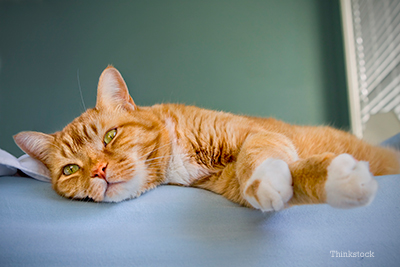
As a veterinarian, I am continually advocating for early disease detection, intervention and treatment. Many of the diseases that affect our pets are deteriorations, rather than sudden failures of the body. Signs and symptoms are often subtly progressive and once these disease states arise, they frequently progress to an irreversible state. It is critical to know your pet and observe changes that may be early indications of disease. Some changes should be addressed right away, including changes in:
- Food intake
- Water intake
- Activity level
- Body weight
Metabolic diseases such as kidney disease, liver disease and diabetes may all be similar in their initial signs (changes in appetite water intake). My own cat, Ritz, recently demonstrated that with an early diagnosis and immediate intervention, a better outcome is possible. For Ritz, an early diagnosis saved him from a lifetime of inconvenience—at the very least—and possibly even from an early death.
My cat, Ritz
Ritz is a 10-year-old orange tabby with a grouchy disposition. He lives completely indoors with his roommate, Mobier. For the last couple of years Ritz has struggled with a chronic itch, and my wife and I have struggled to help him. In spite of our best efforts, a diagnosis remained an enigma. The itch responded only to cortisone injections. We ruled out allergies, parasites and, to the best of our ability, stress induced problems. Finally we were forced to either treat him with cortico-steroids or let him itch.
Ritz was given periodic injections of steroids with mixed results. We tried to minimize his dose, along with the frequency of administration, and for a while things seemed pretty good. Then one day, about 2 weeks after an injection, things changed.
Signs that something was wrong with Ritz
We noticed that after Ritz used his litter pan, the litter was always wetter than it used to be. He also spent more time drinking water than usual. We thought it was probably the steroids, but we wanted to be sure. We submitted to blood and urine tests for Ritz. He had always been very healthy, but we were concerned.
Testing results for Ritz
For Ritz, urine was strongly positive for glucose, but his liver and kidney function were normal. His blood glucose was very high and his level of fructosamine confirmed that he was in fact diabetic. To make matters worse, we had probably caused it.
We started insulin right away and called our friend, Dr. Deb Greco, for her thoughts. Dr. Greco is one of the foremost authorities on feline diabetes and she offered us a straw to grasp: perhaps his diabetes was, in fact, due to the steroids. If so, there was a chance that it was only passing and Ritz would return to normal.
Treating Ritz for diabetes
At Dr. Greco’s suggestion we started feeding Ritz with a new diet. [Editor’s Note: Always check with your veterinarian before starting a new diet.] We did our best to eliminate carbohydrates and emphasize protein in his diet. All the while, we continued low dose insulin and monitored his blood and urine glucose. To our optimistic delight he required very little insulin and, in a few days, his glucose was normal and we began to reduce his insulin until we reached a point where he didn’t require it anymore. We have monitored his blood and urine glucose often and are now comfortable that he is no longer insulin dependent. We are able to keep Ritz regulated solely with diet control. He has been insulin free for 3 weeks. [Editor's Note: Learn more about detecting and monitoring diabetes in cats.]
So what did we all learn from this misadventure? Well, for starters Ritz is sensitive to steroids and so will not be receiving any future injections. This is relatively uncommon, however, if your veterinarian wants to give your cat cortisone bloodwork and urinalyses need to be regularly monitored to detect potential adverse effects early. Secondly, diabetes can be transient in cats, and the best way to catch it (and other diseases) early is to watch for signs and run regular blood testing. Most importantly, know your pet and ask for your veterinarian’s advice sooner than later. In this case, an early diagnosis made for a happy outcome.
Learn more about what to do if your cat, “just aint’ doin’ right.”
If your cat has diabetes, learn more about it here.
If you have any questions or concerns, you should always visit or call your veterinarian -- they are your best resource to ensure the health and well-being of your pets.
